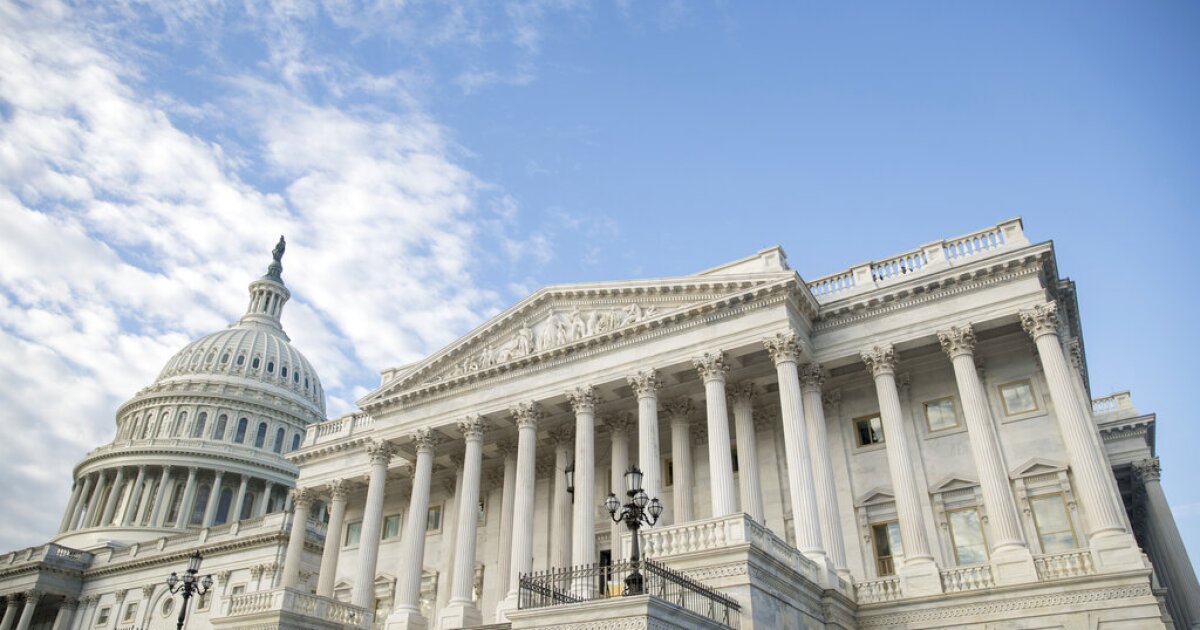

Congress is out for its August recess, but lawmakers left town with work on funding the federal government incomplete, giving themselves about a month to accomplish the major task when they return to the nation’s capital in September.
Lawmakers have until the start of the fiscal year, Oct. 1, to act on government funding. They could come to an agreement and fund the government, or they could pass a stopgap measure until lawmakers in both chambers strike a deal. It won’t be easy no matter which route they ultimately take.
BIDEN ADMINISTRATION INCANDESCENT LIGHTBULB BAN TAKES EFFECT
Senators on the Appropriations Committee approved all 12 of their government funding bills out of the committee last week, the first time in five years. The panel voted on bipartisan lines to send the last four spending bills to the Senate floor, including spending to fund the Department of Interior; Labor; Defense; Education; Health and Human Services; and Homeland Security.
Sens. Patty Murray (D-WA) and Susan Collins (R-ME), the first two women to simultaneously lead their respective parties on the committee, acknowledged there is still much more work to be done.
“We still have to get these bills passed through the full Senate, and House, and signed into law — and that is our focus moving forward,” the senators said in a joint statement last week.
“However, what this committee has achieved over the last several weeks shows that it is possible for Congress to work together and work through real differences — to find common ground and produce serious, bipartisan bills that can be signed into law,” they added.
NEWS: Following a markup, Senate appropriators will have approved all 12 bills out of committee. It’s the first time in five years.
— Samantha-Jo Roth (@SamanthaJoRoth) July 27, 2023
The panel approved all 12 bills, setting them in line with the caps laid out in the Fiscal Responsibility Act negotiated by President Joe Biden and House Speaker Kevin McCarthy (R-CA). The agreement limits overall national security spending in fiscal 2024 to $886 billion, which is roughly a 3% increase from current levels. In fiscal 2025, defense spending would be capped at $895 billion, a 1% increase from the previous year.
The inflation-adjusted cuts have been a point of contention for defense hawks who continue to advocate spending increases to deter Chinese aggression, which is why Murray and Collins announced a bipartisan deal last week to add on an additional $13.7 billion in additional emergency spending, $8 billion for defense and $5.7 billion for nondefense.
Even though Democrats have control in the Senate and on the panel, they included the Hyde amendment in the bill, which funds the departments of Labor and Health and Human Services. This comes after Democrats left it out of their annual government funding bills last year, which blocks people from using Medicaid or other federal health programs to pay for abortion services.
“The way to make this work is do it in a bipartisan way like we are doing in the Senate. If you do it in a partisan way, you’re headed to a shutdown,” said Senate Majority Leader Chuck Schumer (D-NY) during a press conference last week. “I am really worried that’s where the House Republicans are headed.”
Two different visions
The move set up a clash with the GOP-led House, many of whom opposed the debt-ceiling deal and refused to vote for it. An influential block of hard-line House conservatives is having a major influence on the spending process, and as a result, McCarthy and GOP leaders are preparing bills with less spending than previously agreed to in an effort to win over the votes of these members.
“What the House has done is they essentially tore up that agreement as soon as it was signed,” said Sen. Chris Van Hollen (D-MD), a Senate appropriator. “We are in for a bumpy ride.”
The House Appropriations Committee has operated on a much more partisan basis, holding contentious committee markups, with bills advancing on party-line votes. The full House managed to pass its military construction appropriations bill last week, advancing only one of 12 of its must-pass spending bills before leaving town and returning on Sept. 12.
Lawmakers were initially scheduled to leave Washington, D.C., last Friday but ultimately left a day early after it became clear the legislation would not make it to the floor for a vote. House leaders say they will continue working over the break, although it remains unclear whether lawmakers will meet in person to do so. Some members of the House Freedom Caucus are welcoming a government shutdown, claiming the voters elected Republicans in the House in an effort to rein in government spending.
“We should not fear a government shutdown,” said Rep. Bob Good (R-VA) during a press conference last week with other members of the Freedom Caucus. “Most of the American people won’t even miss it if the government is shut down temporarily.”
Good refused to vote for McCarthy during his race to become speaker, which ultimately took 15 rounds of voting to secure the position back in January, and is attempting to wield his influence to force the speaker to cut additional spending.
“Our speaker has an opportunity to be a transformational historical speaker that stared down Democrats, that stared down the free spenders, that stared down the president and said, ‘No, we’re going to do what the American people elected us to do,'” Good said.
McCarthy agreed to draft spending levels below his agreement with the White House following a rebellion on the House floor by hard-line conservatives. The lawmakers, mostly members of the Freedom Caucus, hold outsize sway in the 118th Congress given Republicans’ narrow five-seat House majority.
Republicans in the House are also adding a litany of amendments broadly opposed by Democrats. There are proposals to limit access to abortion pills, block Veterans Affairs from displaying pride flags, ban funding hormone therapy and some surgeries for veterans who are transgender, and others.
The policy add-ons are broadly opposed by Democrats and have no chance of passing in the Democratic-controlled Senate. The White House already issued a veto threat for the military construction appropriations bill the House passed along party lines last week.
Congressional Progressive Caucus Chairwoman Pramila Jayapal (D-WA) acknowledged the reality of a potential shutdown as a result of the amendments being offered by House Republicans.
“It’s offensive,” Jayapal said last week. “It is not what the American people need, and they have no interest in trying to legislate for what we actually need to do in this body.”
Amid doubts the House’s spending bills could make it through the Senate, McCarthy met with Schumer ahead of the August recess to begin negotiations and discuss how the two chambers could avoid a shutdown. It is still unclear what exactly was discussed in the meeting.
“I don’t want the government to shut down,” McCarthy said during a press conference last week. “I want to find that we can find common ground.”
Another complicating factor is House conservatives have insisted that leadership vote on 12 separate government funding bills instead of a large “omnibus” spending bill, which typically speeds up the process.
CLICK HERE TO READ MORE FROM THE WASHINGTON EXAMINER
When lawmakers return to the nation’s capital, the House and Senate will have roughly three weeks ahead of the Sept. 30 deadline to pass a federal budget. Budget disagreements typically drag out as both parties fight to include their own priorities, with a final deal often not made until the 11th hour after a marathon voting session.
If lawmakers are unable to come to an agreement before the deadline, they could pass a continuing resolution that will keep funding at or close to current levels in an effort to give lawmakers more time to negotiate a deal. However, some hard-line conservatives are already ruling that process out, noting they aren’t afraid of enforcing a government shutdown to get the budget passed.





